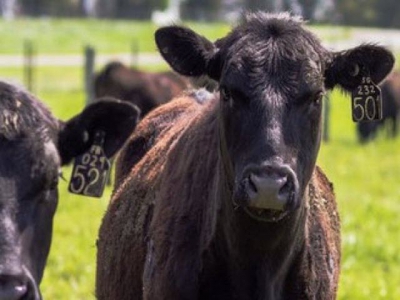Michigan identifies new cattle herd with bovine TB

Alpena county herd is within state's modified accredited zone for bovine tuberculosis management.
Bovine tuberculosis (TB) was recently confirmed in a small beef herd in Alpena County, Mich., the 74th cattle herd to be identified with bovine TB in Michigan since 1998, the Michigan Department of Agriculture & Rural Development (MDARD) reported.
MDARD said the herd was identified through routine surveillance testing.
Bovine TB, a bacterial disease that affects primarily cattle, is endemic in the free-ranging white-tailed deer population in Michigan’s modified accredited zone (MAZ), a U.S. Department of Agriculture designation for Alcona, Alpena, Montmorency and Oscoda counties, MDARD said.
In the zone, contact with deer can be a potential source of bovine TB infection for cattle. Preventing deer from having access to cattle feed, feed storage or watering areas is crucial for farmers in this area of Michigan and is a part of the wildlife biosecurity program overseen by MDARD and its partners, the agency said.
As part of MDARD’s standard disease response, an investigation will be conducted to identify and test herds that had an association with the infected herd. In the MAZ, annual surveillance and movement testing are required of cattle producers, which helps detect disease early and prevent it from being moved off the farm.
"Although a great deal of work is being done by producers in this area of the state, MDARD, the Department of Natural Resources [DNR] and partner agencies to prevent bovine TB cases, we do still occasionally see newly infected herds," Michigan assistant state veterinarian Nancy Barr saod. "Responding to them in an effective manner helps prevent further cases and protect the state’s TB-free status in the remainder of the state. MDARD and the DNR are working with farmers, hunters and community members to preserve and maintain healthy cattle, healthy deer and healthy communities."
Michigan recently established a "potential high-risk area" around bovine TB-infected deer outside of the MAZ.
Có thể bạn quan tâm
 Study Starch source influential in dairy cow diets
Study Starch source influential in dairy cow diets Corn processing and reduced crude protein degradability may influence milk ethanol stability, say researchers.
 Cow/calf producers reminded to conduct bull soundness exam
Cow/calf producers reminded to conduct bull soundness exam Spring-like weather means cow/calf producers need to get bulls ready for the upcoming breeding season.
 Cattle preconditioning programs add to bottom line
Cattle preconditioning programs add to bottom line Extension specialists describe how preconditioning programs add to cow/calf operation's bottom line and improve return on investment.